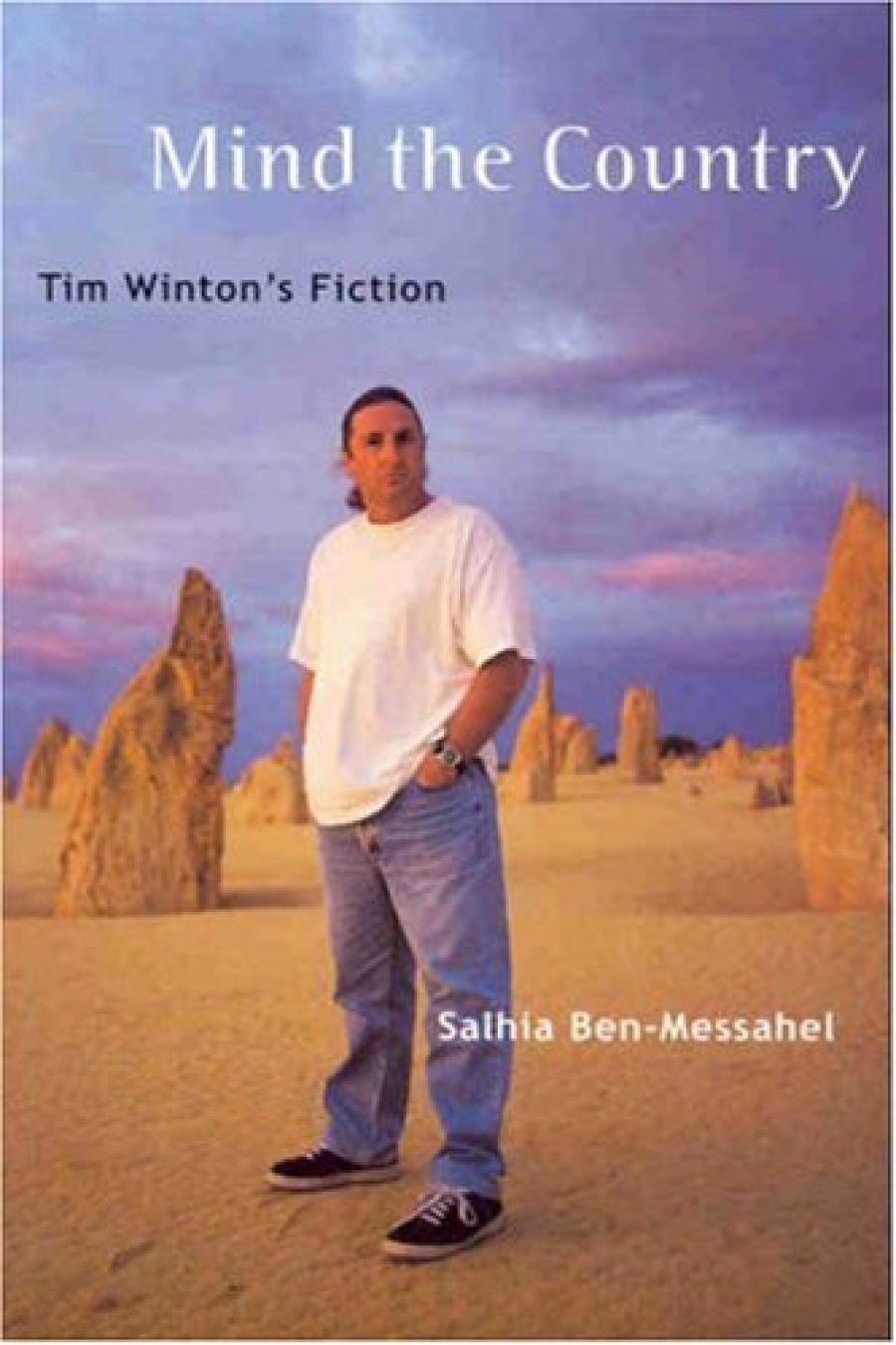
- Free Article: No
- Contents Category: Literary Studies
- Review Article: Yes
- Article Title: The blank darkness
- Online Only: No
- Custom Highlight Text:
University of Western Australia Press should be commended for recognising a significant gap in Australian literary scholarship: a book-length study on the work of Tim Winton. Aside from Tim Winton: A Celebration (1999; not a critical work), and Michael McGirr’s Tim Winton: The Writer and His Work (1999), written for young readers, there have been no major studies of his work and little critical commentary. Is Peter Craven’s response to Dirt Music (2001) – which he called a ‘profoundly vulgar book’ that ‘bellyflops into a sort of inflated populism’ – widely shared? Is Winton on the nose because he is popular? Certainly, there is nothing sexy about Winton’s work; it embodies wholesome and worthy values, without shying away from stories where these values are absent. But he is a damn good writer – a difficult thing to measure, I know. His work resonates for many people. Whether they adore it or hate it (think Cloudstreet [1991]), people who have read Winton have an opinion on him. Winton’s work, particularly The Turning (2004), prompts interesting questions about contemporary Australian life.
- Book 1 Title: Mind the Country
- Book 1 Subtitle: Tim Winton's fiction
- Book 1 Biblio: UWA Press, $39.95 pb, 287 pp
Mind the Country, however, is a vague, underwhelming, structurally flawed, badly written, loosely edited book, so much so I am surprised it was published. Salhia Ben-Messahel herself is an admirable figure. The child of two Algerians who could neither read nor write, she was born in France and completed three degrees before arriving in Western Australia, where she developed a working relationship with Winton. The book is part of a commendable project ‘to provide opportunities for Australian and French scholars to work with each other’. Ben-Messahel clearly knows Winton’s short stories and novels extremely well, and she delivers a close textual reading which, apart from the nodding acquaintance with post-colonialism, shuns theory. She makes deft connections between Winton’s characters, and the inclusion of a map of Western Australia pointing out where Winton’s stories are located is sensible.
Yet Mind the Country does not mount a cohesive argument in relation to Winton’s work, and this creates a lack of structure in the work as a whole. Sections such as ‘The Marginal Self’ and ‘Margin and Centre’ barely distinguish themselves, and do not develop a meaningful or complex argument. Ben-Messahel continually asserts that Winton’s characters are ‘marginal’ and ‘other’, but these terms remain undefined and uncontextualised. There is no sense of progression; sentences, paragraphs and chapters do not build on one another. Indeed, the book is a series of one-sentence, subjective assertions, rarely backed up by evidence or a logical argument. Discussing the character Jennifer, who remains absent from The Riders (1994) because the narrative centres on her husband Scully’s search for her in Europe, Ben-Messahel writes: ‘the mysterious woman is pursuing the shadow of the woman she thinks she is; she is incapable either of expressing her real feelings or confronting her own flaws.’ It is a curiously detailed assessment of an absent character.
Ben-Messahel would have benefited from engaging with Jennifer Rutherford’s analysis in The Gauche Intruder (2000), which is strangely absent from her bibliography. Rutherford argues that Jennifer’s absence from the novel is deeply suspect from a feminist point of view, and that it allows the male characters to project their desires on to the woman. While Ben-Messahel might not agree with Rutherford’s reading, it would have been useful to explore the issue. Elsewhere, Ben-Messahel contends that Cloudstreet presents Australian ‘society [as] no longer a patriarchal but a matriarchal one, since women seemed to have survived as the fittest of the species’, but she neither casts doubt on, nor substantiates, this radical claim. In the absence of a theorised argument, Ben-Messahel’s assertions appear random and resemble the ‘flotsam and jetsam’ that she, like Winton, is fond of invoking.
Mind the Country is not a very readable book. This is partly because the language is imprecise and syntactically flawed. The quantity of punctuation, grammatical and layout errors led me to wonder if the publisher had accidentally sent a draft version to the printer. The following sentences exemplify the writing style: ‘Axle’s anger and burning of the map reflect black Australians’ dispossession of the land by British colonialists’; ‘the stories attempt to reintegrate History through human experience and cosmic time and, in doing so, to abolish Time’. If such innovations as ‘connotations’ are deliberate, then they should be explained.
Ben-Messahel does not introduce her quotes (and she relies heavily on these), so one has to look to the endnotes to find a quote’s author. Quotations within quotations are not sourced. The final chapter is dedicated to proving that we should keep the term ‘regionalism’ in mind when considering Winton’s work. Ben-Messahel begins by quoting Winton, who says ‘you can’t push the regional idea too far. WA writers are remarkably unlike one another.’ A counter-argument has been raised, but Ben-Messahel ignores it, beginning the next line: ‘the regionalist mood that appears in the stories …’ In other moments, as in her discussion of the verandah as an ‘intermediate, transitory space’, she should have acknowledged the work of Philip Drew, which includes remarkably similar phrasing.
When Ben-Messahel concludes, ‘the stories confront the artist with the inability to liquidate the past once and for all because there is a world, a white space, between the indigenous other and Winton, the Aborigine, a blank darkness at the heart of the country’, I too felt confronted and wondered about the ‘blank darkness’ at the heart of Australian literary criticism and publishing.


Comments powered by CComment